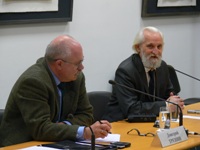Registration
You will receive an email confirming your registration.
IMGXYZ2469IMGZYXRussia is fundamentally a European country and, anti-Western tendencies notwithstanding, it has the opportunity to eventually mold its future with its Western neighbors, argues Alexander Yanov, author of the three-volume publication Russia and Europe: 1462-1921.
The trilogy, produced by Novy Khronograf publishing house, is dedicated to the origins and prospects of the European tradition in Russia. On the occasion of the 80th birthday of the writer, a renowned Russian thinker, public philosopher, and author of 20 books, a group of panelists gathered to discuss Yanov’s trilogy at an event hosted by the Carnegie Moscow Center. According to participants, Yanov’s latest opus is an “extraordinarily vibrant historical and journalistic work, inviting the reader where it should – to Europe.”
Carnegie’s Dmitri Trenin provided an introduction. Lev Regelson, writer and church historian, moderated the event.
Central theses of the trilogy
Yanov proposes an innovative reading of the history of Russian statehood. He argues that Russia is basically a European country by origin, torn throughout its history by two opposing forces: the European (contractual) tendency, and the paternalistic (servile) trend.
- Russia’s European century: Yanov disputes the conception that Russia’s origins trace back to the Mongol Golden Horde, which occupied Russia and much of Eastern Europe in the 13th-15th centuries, leaving an alleged “eastern imprint” on national development, and rejects the thesis that the paternalistic tendency is exclusive in Russian history. According to Yanov, during the period from 1480 to 1560 – the period of the “European century” – Muscovite Russia carried on the European tradition.
- The anti-European tradition: Yanov connects the rise to dominance of anti-Europeanism with the period of the so-called Oprichnina under Ivan the Terrible, when the tsar’s political police enforced mass terror.
- The fall of the anti-European tradition: Yanov maintains that the last bastions of the “anti-European fortress” were destroyed after the fall of the USSR – except for the paternalistic tendency. “The only remnants of the imperial legacy are historical rot and powerful paternalistic stereotypes that have consolidated in the collective consciousness over the course of centuries. It is necessary to fight them,” urges Yanov.
Discussion of Yanov’s trilogy
During the course of the discussion of Yanov’s work, many participants agreed with the author’s main thesis – that Russia, by its origins, is a European country – but some did not agree with the way Yanov justified his argument.
- Igor Kondakov of the Russian State University for the Humanities argued that a historicist critique of Yanov’s work might fail to understand the basic underpinnings of the trilogy. Despite the fact that Yanov has worked on history his entire life, Kondakov argued, Yanov “is not a historian, but a philosopher – a philosopher of history, of which there are decidedly few.
- Irina Karatsuba of the Moscow State University noted that Yanov is perhaps the only scholar who has attempted to build a unified conception of Russian history from ancient times through the present day, since historians Klyuchevsky and Milyukov at the end of the nineteenth and the beginning of the twentieth centuries – and it is precisely Klyuchevsky’s line that Yanov pursues. “He is the only heir of Klyuchevsky’s tradition today.”
- Sergey Magaril of sociology department of the Russian State University for the Humanities pointed out that Yanov’s works are deeply modern and extremely timely. Yet his vulnerability is not in his concept, but in his belief that there can be a straightforward answer. Yanov is a rare representative of historiosophy (the philosophy of history) and every new commentary in historiosophy in itself is a great contribution.
In conclusion, Dmitry Zimin, founder of the Dynasty Foundation, declared Yanov “our outstanding contemporary, because he is a brilliant writer who stimulates interest in Russian history.”
